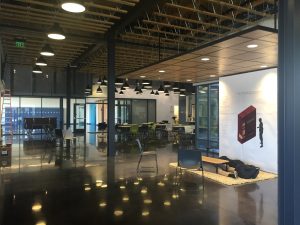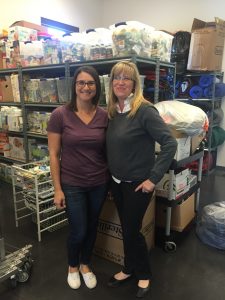
Salt Lake City — Hope sprang eternal for homeless youth as the new Volunteers of America shelter became operational and open to the youth for the first time Thursday, May 26 after a grand opening on May 24.
The $6 million, 20,000 square-foot facility replaces the old shelter was on State Street. It offers not only the same resources that the old shelter did but also overnight housing.
“The old facility was open from 9 a.m. to 5 p.m., Monday through Friday,” said Volunteers of America – Utah spokeswoman DeAnn Zebelean. “It was hard at the end of the day to watch those kids leave and wonder if they’d come back the next morning. Now, because this facility is 24/7, they don’t ever have to leave.”
Besides providing transitional housing for homeless youth aged 15-22, the shelter offers three meals per day, employment services and access to a legal clinic and educational center. The shelter also provides counseling by trained therapists equipped to aid youth with mental or emotional difficulties, which are usually brought on by some sort of past trauma.

“This is a game changer,” said Tyler McCraley, a former volunteer at the shelter who is now working with his partner, Michael Mathie, to do something similar in San Diego. “Three years ago, we found out that there was not a single place in Utah where a kid could sleep if they were homeless. This shelter is the first of its kind in Salt Lake City.”
According to Zebelean, more than half the youth who come to the shelter are young adults who have aged out of the foster care system but are unable to support themselves without further help. Others have left home because of abuse or disagreements with their parents.
“Of the clients reporting, sexuality is something very hard for them to talk about and report. Some don’t really know who they are or how they feel at this point,” Zebelean said. “Of the clients that report, about 22 percent identify as LGBTQ, and many of them feel like their home isn’t really a fit for them anymore.”
The shelter does contact the families of all youth age 18 and under who check in to the facility. After talking with the youth, and their families, therapists and legal counsel work with the state, the center decides whether clients should be returned to their families or placed into a transitional home.

“I donate a lot of stuff — as much as I can, because I’ve been there,” said Jessica Johnson, a volunteer at the shelter. “Drugs, alcohol, teenager, abusive parents — I was on my own. I was hiding from the foster care system because I didn’t want to end up there. In Nevada, they’d move you and you’d end up in a different city, so you wouldn’t be around your friends or people that you knew. I was sleeping in and out of cars and parking lots and behind the school. I wish I had had a center like this.”
With more than 1,000 homeless teens living on the streets of Utah, the shelter is always looking for volunteers. The shelter at 888 S. 400 West, Salt Lake City, accepts all sorts of donations from the community and receives the majority of its food from the Utah Food Bank and the Bishop’s Storehouse of The Church of Jesus Christ of Latter-day Saints.
“We’re right off Frontrunner,” Zebelean said. “We’re always in need of volunteers, especially college students who can work with and help the kids here.”
To find out how to volunteer, go to www.voaut.org/volunteer to fill out an application.




